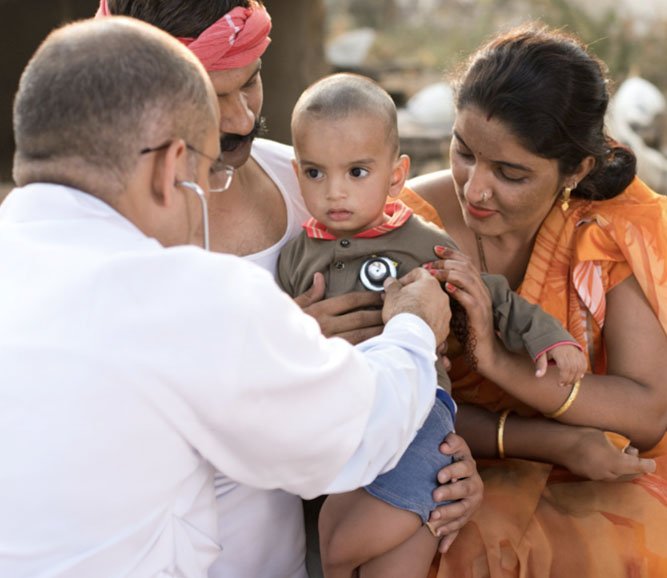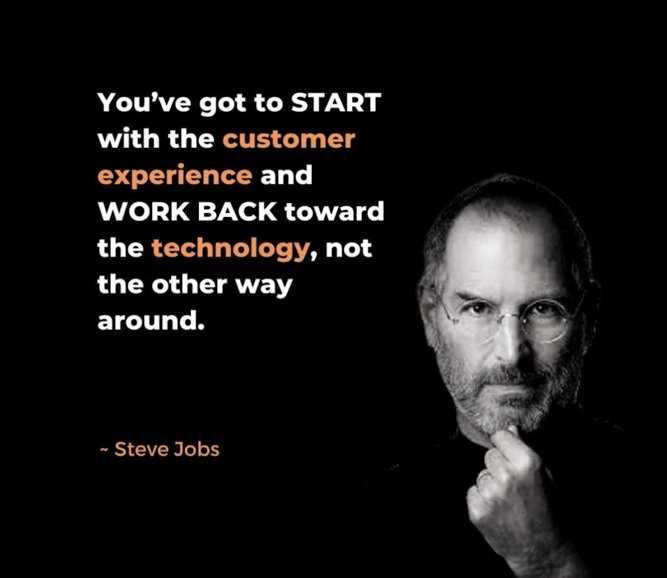The role of pharmaceutical field force is still very important and this is likely to continue for the foreseeable future. Instead of standing against the notion, we should focus on building next-gen capabilities for this field force. This includes designing a more holistic model of response and focusing on how we can build on changes in our selling engagements.
The next-gen capabilities for medical sales representatives will help companies to engage with their customers in new ways, including forecasting and predicting resource needs based on customer journeys, providing on-demand access to information, activating SMEs during customer engagements
In this article, we look at how medical sales representatives will evolve. We see that they have the potential to go beyond traditional selling engagements (such as product detailing). In fact, when the field force is paired with the latest tech in pharma marketing, they become a powerful contender in the race to get new pharmaceutical products to market.
There was a phase when the industry feared that digital would eventually replace the medical sales representative but it appears that digital engagements work best when facilitated by an affable and knowledgeable person, who can personalize the information, and the conversation, to the doctor. In pharma, there’s no substituting face-to-face dialogue it seems. And why should it?
“Rather than digital replacing a person in pharma, the need of the hour is digitalizing the approach of person. The person and the technology are HERE TO STAY”, says Archis Joshi, Commercial Head at Dr. Reddy’s.
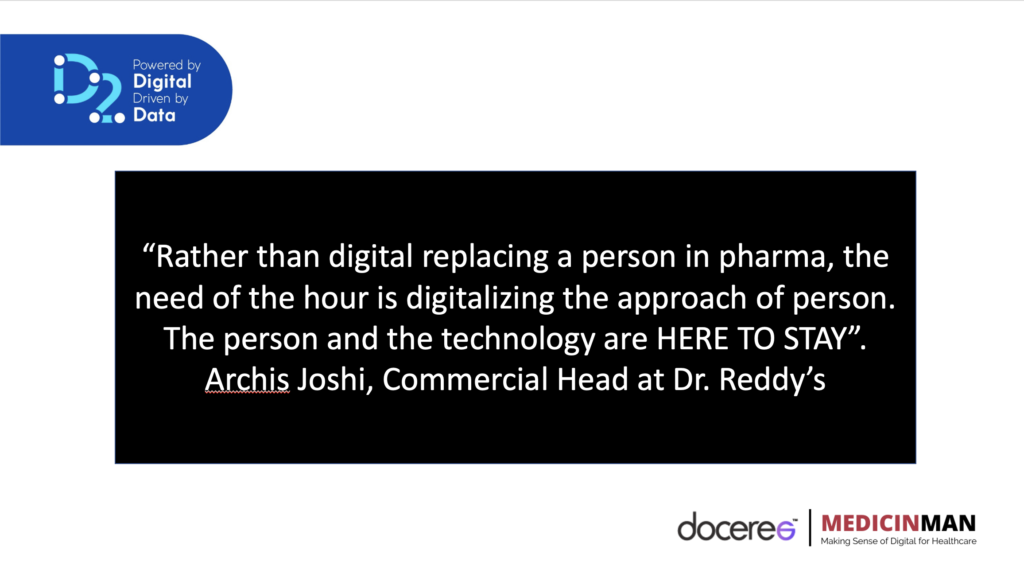
The sales role is getting tougher. Medical information, at one point pharma’s greatest value, is today much more freely available than it used to be. In the Indian market which is dominated by generic medicines lacking differentiation, simply informing doctors about the product, isn’t a viable prospect anymore when it comes to piquing their interest.
“Why are brands that have been around for some time still unable to cross the marketing funnel and are still stuck at either the ‘awareness’ or the ‘interest’ stages, and unable to move towards the ‘purchase’ or ‘recommendation’ stages?” wonders Mehul Shukla, Director, Marketing Excellence at Cipla.
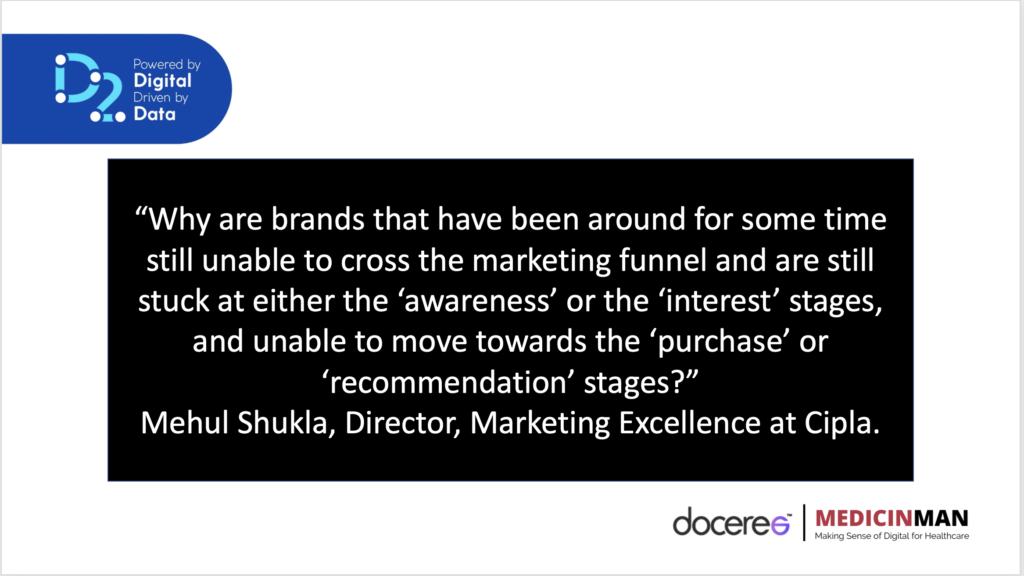
In the near future, medical sales reps will be expected to balance selling their product with services that doctors will value to build their own practice. This may include patient care and relationship building. Not only will services create stronger differentiation, they will also make the medical sales representative career extremely rewarding with the job becoming much more patient-centric and relationship-focused than it used to be.
Elaborating on the point, K. Satya Mahesh – Former Head of Business Excellence at Emcure said, “We all understand that most of the relationships are built on value exchange. However, the value offered has to be perceived as valuable!
The axiomatic “KASH” – Knowledge, Attitude, Skill, and Habits of the field associates augmented with differentiated services by the organization are vital to create long-lasting value and relationships. It is imperative that these services offered to the customers are relevant and rewarding.
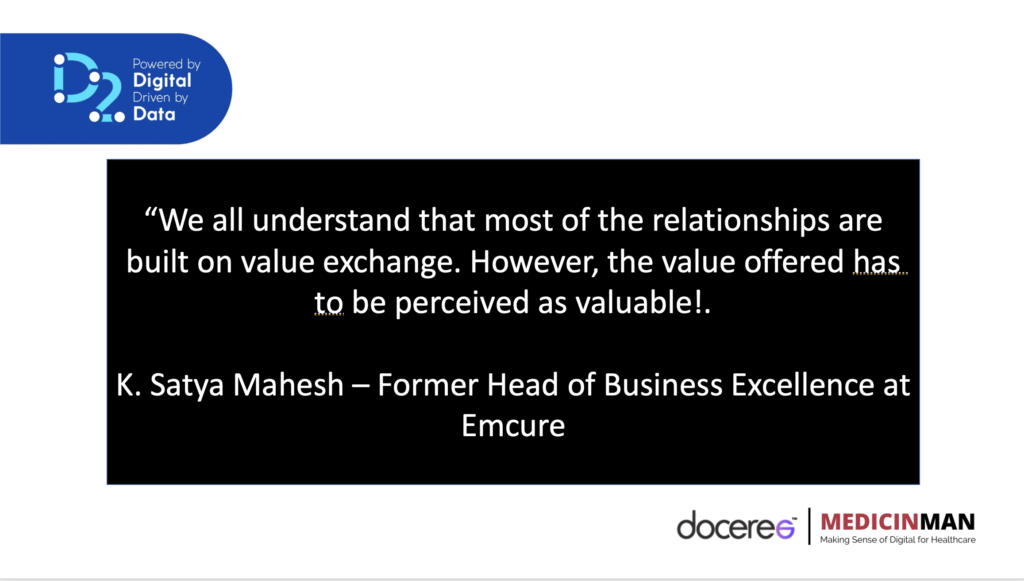
Initiatives such as patient services help treatment adherence, undeniably the least understood pharma growth lever. These services create better disease outcomes. Hence, the impact will be long-lasting as the interests of both parties converge at better patient health outcomes.
The future is going to be with those organizations and medical representatives who recognise the need for such knowledge-centric and patient-centric services. This indeed serves the purpose of the pharmaceutical organization, the medical representative, and also the doctor for better business and health outcomes.”
If the future of pharma selling is not a sales-oriented approach but a relationship-focused one, what are some specific skills that will be needed to make it work? MedicinMan asked industry representatives what they thought would help and four parameters emerged.
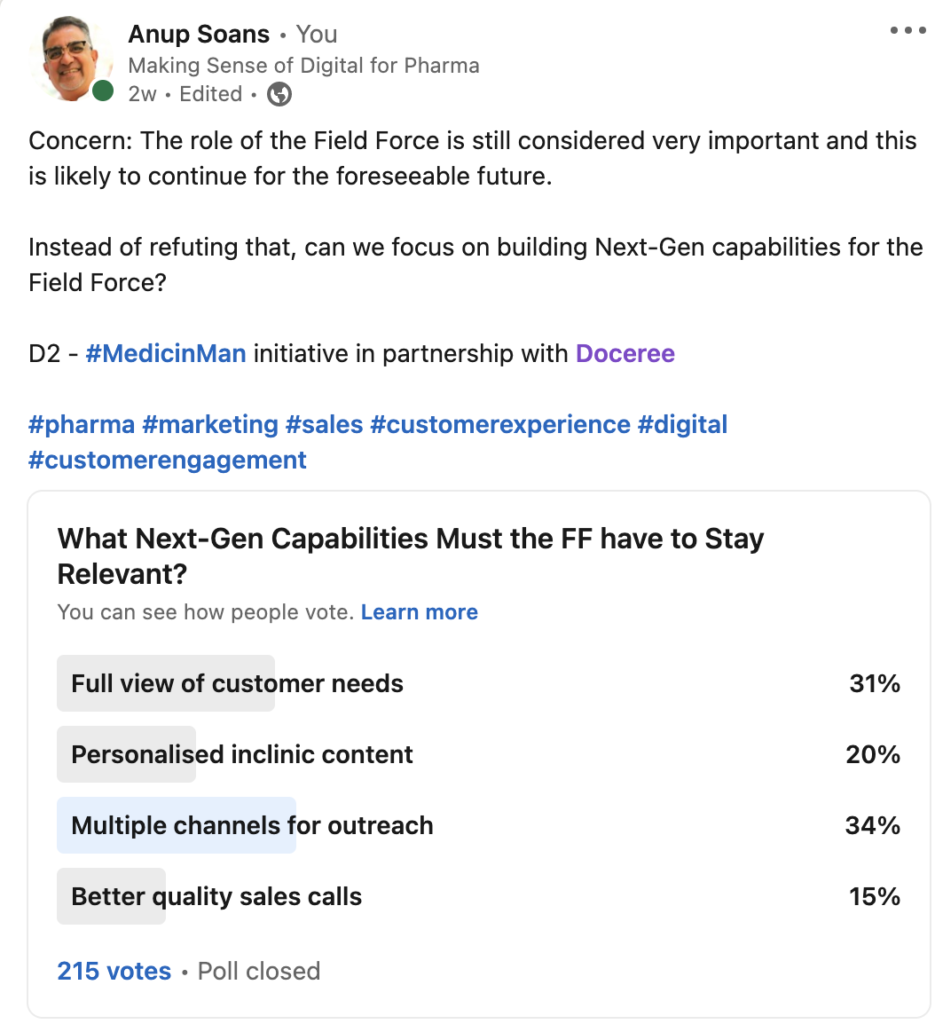
- Multiple channels for outreach
Hyper-competition in the generic industry creates an acute need for a brand to stay on top of the doctors’ minds. To make this happen, medical sales representatives need to create opportunities to call on doctors and ‘remind’ them of their brands. Often this is overwhelming and leads to customer annoyance thus creating the opposite of the intended effect. Since sales call cost money, it is also a significant drain on company resources. As an alternative, several digital players have emerged with solutions to create ‘multi-channel engagement’ for pharmaceutical companies. This involves marketing via emails, websites, webinars, and WhatsApp/SMS in addition to the effort of the medical sales representative. In the MedicinMan poll, building multiple channels for outreach to doctors emerged as the most important capability that would assist the future role of the medical sales representative.
- Full View of Customer Needs
As we said before, we believe that pharma must evolve from selling products to building relationships through services. If this is the case, it is very difficult to serve someone we know precious little about. Hence one of the future skills for the pharmaceutical sales force will be to provide them with a full view of customer needs. Most medical sales representatives do this intuitively as they know their customers the best. However, the role of a central data repository and advanced analytical tools can provide much better insights to aid the work of the field force. In the MedicinMan poll, this parameter emerged as the second most important future capability.
- Personalised in-clinic content
Traditionally, pharma has used data to analyse go-to-market strategy and less around the content used for product promotion. Content development has been driven by brand-specific needs. Now and in the future, the role of personalised content will be of paramount importance. Personalisation creates relevance and there is enough evidence to prove that relevance is the most important trait that creates engagement. Without engagement, no multi-channel or physical meeting will create the desired response from doctors. It was, therefore, quite surprising to see that this parameter emerged as the third in the list of four future capabilities.
- Better quality sales calls
Improving the quality of our sales call has been the focus of the commercial excellence function for years. Today, more than ever before, data streaming from doctor calls is making it easier to determine how to improve the quality of the calls. During the pandemic, companies that utilized closed-loop marketing platforms and used the data to inform their future calls, saw average call times improve from 0-3 minutes (2019-20) to 18-22 minutes (2020-21). How can we make this sustainable? Will this continue in the era of ‘phygital’ work where medical sales representatives meet the doctor physically? This would be an important skill to debate and discuss and this parameter featured as the fourth future skill that field forces need to develop.
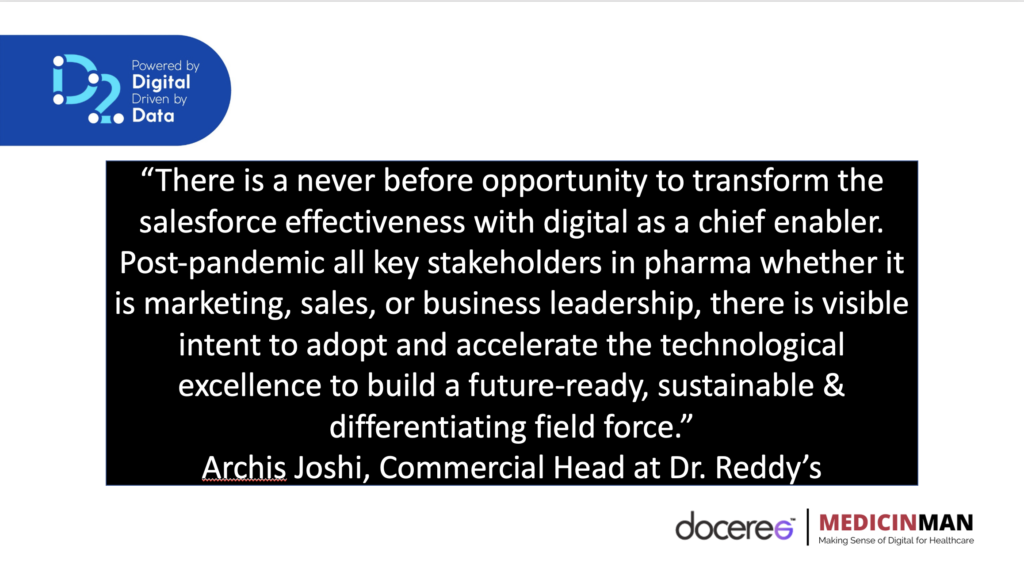
Commenting on the MedicinMan poll, Archis Joshi said, “There is a never before opportunity to transform the salesforce effectiveness with digital as a chief enabler. Post-pandemic all key stakeholders in pharma whether it is marketing, sales, or business leadership, there is visible intent to adopt and accelerate the technological excellence to build a future-ready, sustainable & differentiating field force.”
Satya Mahesh agreed. “In fact, most of us believe that all four options are quite important. I believe the first in building a relationship focussed sales model is understanding the Customer’s needs, wants, and wishes.
This deep understanding of the customer help delivers Targeted, customized, and personalized messages through the customer’s right channel of preference. As we all know the preferred channels are different for different customers (which also may change with an organization, brand, and time frame), it is important to have access and skill to manage the ideal mix of multi-channel modes of communication to the field associate.
A clear understanding of customers’ needs helps us Refine, Elucidate, Augment and personalize the content that is relevant and valued by the customers. This promises a better quality of calls,” Satya added.
The pharmaceutical industry is shifting from a mass market to a target-market approach to increase revenue. The pharma industry is no longer being rewarded for incremental innovation, me-too products, and selling the most pills. Pharma must focus on discussing how their brand adds value to patients, and drive engagement by offering a package of products and health services that the market will pay a premium for. “We marketers need to find our digital golf course”, says Mehul Shukla implying that just as CEOs of different companies connect on golf courses, companies have to connect with customers similarly.
As part of the D2: Driven by Data, Powered by Digital campaign, MedicinMan will host a panel discussion with industry experts to highlight some very strong facts related to the need for Pharma to change its marketing and sales functions in order to sustain future growth and performance. Watch this space.






